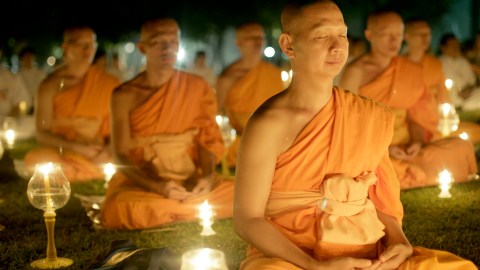Harvard Has a Free Online Course on Buddhism That You Can Take Right Now

If you wanted to learn more about Buddhism, but needed an easy and authoritative resource, you are in luck. Harvard University made a great course on the religion available online for free.
While the “Buddhism Through Its Scriptures” course is no longer interactive and has been archived, all of its rich lecture and supplemental materials are available upon registration.
The course is taught by Professor Charles Hallisey from Harvard’s Divinity School, who is also the Yehan Numata Senior Lecturer on Buddhist Literatures. His 2015 book highlights poems by first Buddhist women.
The introductory course is meant for both a complete novice and a more seasoned practitioner as it goes over Buddhist teachings, selected readings and practices. Art and devotional acts are also considered.
The course is designed to take 4 weeks, asking for 6-10 hours per week of your attention.
Professor Hallisey is interested in presenting the course to people of “diverse backgrounds” in order to “interact constructively around topics that too often divide us”. His philosophy is to not impart the “right” interpretation of Buddhist scriptures but rather to keep and foster an open-mindedness, allowing for different perspectives, which Buddhists themselves often have even on their main documents.
While there is no one central Buddhist text like the Bible or Koran, there are Buddhist writings like the Pali canon, the writings of the Japanese Zen Master Dogen, or the collection of meditation topics Mumonkan that are explored by Hallisey.
He further addresses his approach to teaching the course on Buddhism this way in his syllabus:
“When we turn to the Buddhist heritages for help in answering some questions that we bring to the study of Buddhist scriptures, we open ourselves to the possibility of not only learning about Buddhism, but also learning from Buddhism. This openness to learning from Buddhists is not in the sense of saying that a Buddhist interpretation is automatically the “right” interpretation. Rather, it is to see that Buddhists themselves have thought about many of the same questions that we bring to Buddhist scriptures, and many of the same questions that we have about ourselves, as persons, and about this world in which we find ourselves. “
Ready to start your journey into Buddhism? Register here.
Cover photo: Buddhist monks meditate at the yard of Borobudur temple, built between 750 and 842 AD, June 1, 2007 in Magelang, Central Java province, Indonesia. (Photo by Dimas Ardian/Getty Images)





